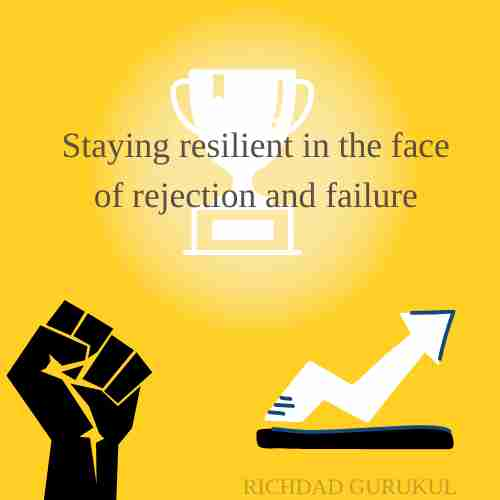Staying resilient in the face of rejection and failure
Rejection and failure are inevitable parts of life. Whether it’s a job application, a romantic relationship, or a personal project, we all experience setbacks and disappointments. However, the ability to bounce back from these challenges and continue moving forward is what sets successful people apart. Resilience is the key to staying motivated and achieving long-term success, even in the face of rejection and failure.
The first step to building resilience is reframing the way you think about rejection and failure. Instead of viewing them as personal attacks or signs of inadequacy, try to see them as opportunities for growth and learning. Every rejection and failure is a chance to gain valuable feedback and improve your skills for the future. Remember that successful people have all experienced rejection and failure at some point in their lives. It’s how they respond to these challenges that sets them apart.
One effective strategy for staying resilient is to practice self-compassion. It’s easy to be hard on yourself when things don’t go as planned, but this kind of negative self-talk can actually make it harder to bounce back. Instead, try treating yourself with the same kindness and understanding you would offer a friend who was going through a tough time. Acknowledge your feelings of disappointment or frustration, but remind yourself that these setbacks don’t define your worth or potential.
Another important aspect of resilience is having a strong support system. Surround yourself with people who believe in you and your abilities, and who will encourage and motivate you to keep going, even when things get tough. This could be friends, family, colleagues, or even a therapist or coach. Don’t be afraid to reach out and ask for help when you need it.
It’s also important to practice self-care when you’re facing rejection and failure. This means taking care of your physical, emotional, and mental health, even when it feels like everything else is falling apart. Make sure you’re getting enough sleep, eating well, and exercising regularly. Engage in activities that bring you joy and help you relax, such as reading, listening to music, or spending time in nature. Taking care of yourself in these ways can help you stay grounded and resilient, even during difficult times.
Finally, remember that resilience is not about never feeling pain or disappointment. It’s about learning to cope with those feelings in a healthy way, and using them as fuel to keep moving forward. Don’t be afraid to take some time to process your emotions and reflect on what you’ve learned from your experiences. This kind of self-reflection can help you gain valuable insights and perspective, and prepare you for future challenges.
In conclusion, staying resilient in the face of rejection and failure is an essential skill for achieving long-term success. By reframing the way you think about these challenges, practicing self-compassion, building a strong support system, practicing self-care, and engaging in self-reflection, you can develop the resilience you need to keep going, even when things get tough. Remember that every rejection and failure is an opportunity for growth and learning, and that with resilience and perseverance, you can achieve your goals and live a fulfilling life.

